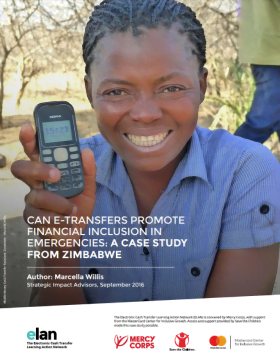Can E-Transfers Promote Financial Inclusion in Emergencies: A Case Study from Zimbabwe
The Electronic Cash Transfer Learning Action Network (ELAN) launched research to build an evidence base around connecting emergency electronic transfer (e-transfer) recipients with additional financial services. They wanted to learn if, when, and how e-transfers can promote sustained uptake and use of e-transfer services, including mobile money.
This case study explores a humanitarian assistance project implemented by Save the Children (SC) Zimbabwe between October 2014 and July 2015. The Emergency Food Security Cash for Training/ Work Project (EFSP) was designed to support consumption and food security among 6,500 vulnerable households in through conditional and unconditional cash transfers delivered through mobile money. The project was implemented in northern Zimbabwe’s Binga district, which has been affected by chronic food security issues for many years. EFSP Recipients received 28 USD per month, for six months, via EcoCash (Zimbabwe’s largest mobile money provider). The transfer was intended to cover the cost of a specific “food basket” to improve household’s capacity to meet consumption needs. There was no specific intent to link e-transfer recipients to additional financial services or to encourage use of the mobile money account after the project’s end.



